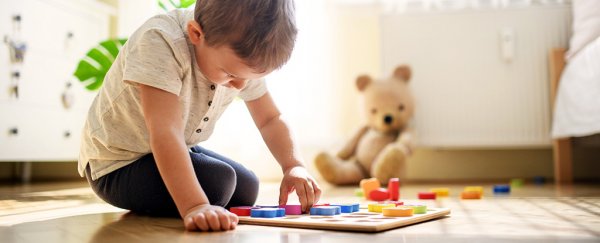For nearly one in five children diagnosed with autism spectrum disorder ( ASD), the origins of their distinct mix of behavioural characteristics can be traced back to an attack carried out by their mother's immune system on their developing brain.
With help from a program designed to hunt for subtle patterns hidden in complex mixes of data, researchers have come up with a test for the antibodies responsible for the misguided assault, allowing them to predict the risk of a child being born with autism with unprecedented confidence.
Scientists from the University of California, Davis, and Stanford University in the US analysed plasma taken from 450 mothers with children diagnosed with ASD, and from 342 mothers who had children without a diagnosis.
The results were used to develop what's known as an enzyme-linked, immunosorbent assay (ELISA) – a diagnostic method of identifying the presence of materials in a solution by way of specialised antibodies embedded in the wall of a container.
In this case, the targets were eight proteins, previously identified as primary suspects in an immune response waged by the mother on her foetus's developing nervous system.
Once believed to be 'immune privileged', sitting beyond the reach of antibodies and protective white cells, it's now clear that a growing brain can be affected by maternal antibodies during gestation.
A review published in 2019 by UC Davis immunologists Karen L. Jones and Judy Van de Water demonstrated a likely pathway by which autoantibodies produced by the mother could react with key proteins in foetal neurons to give rise to maternal autoantibody related (MAR) ASD.
In this latest research, Van de Water and team used machine learning to rank the impact of combinations of autoantibodies linked with developmental markers such as collapsin response mediator protein (CRMP) and guanine deaminase (GDA).
The ELISA developed by the study was validated in identifying the presence of antibody combinations with 100 percent accuracy.
While a diagnostic tool based on it won't rule out ASD, or predict a future diagnosis with certainty, it paints a clear picture of the risks involved.
"For example, if the mother has autoantibodies to CRIMP1 and GDA (the most common pattern), her odds of having a child with autism is 31 times greater than the general population, based on this current dataset. That's huge," says Van de Water.
"There's very little out there that is going to give you that type of risk assessment."
Far from a single condition, autism is an umbrella term for a broad range of functions and behaviours resulting from variations in connectivity across the brain.
Characteristics can vary in severity from the profound to the subtle, affecting how the individual socialises, communicates, and responds to stimulation.
Just as there is a diverse range of traits associated with ASD, there is no single cause, with anything from environmental influences to genetic changes playing a significant role in its formation.
Around 20 percent of diagnoses appear to be linked with some kind of maternal autoantibody response, making it a major factor in the development of ASD.
"We can envision that a woman could have a blood test for these antibodies prior to getting pregnant. If she had them, she'd know she would be at very high risk of having a child with autism," says Van de Water.
"If not, she has a 43 percent lower chance of having a child with autism as MAR autism is ruled out."
Combined with other recent studies providing solid foundations for highly accurate ASD diagnostic tools, we might expect a future where parents can be well prepared for the possibility of raising an infant with autism.
Of course, the decision on whether to proceed with trying for a child would then be up to the family involved.
The researchers are looking into the possibility of applying the knowledge of maternal autoantibodies to the prevention of ASD, by investigating the process in animals.
"We will also use these animal models to develop therapeutic strategies to block the maternal autoantibodies from the foetus," says Van de Water.
The question of how to apply growing knowledge of ASD development will no doubt remain a controversial one.
While autism comes with its fair share of challenges in a heavily stimulated, socially complex world, notions of prevention or curing its spectrum of traits can come at the expense of accepting there's a value in neurodiversity.
In the very least, studies like this one could provide expectant parents with an opportunity to research ways to accommodate their kid's needs (while learning a few myths and misconceptions on autism along the way).
This research was published in Molecular Psychiatry.
